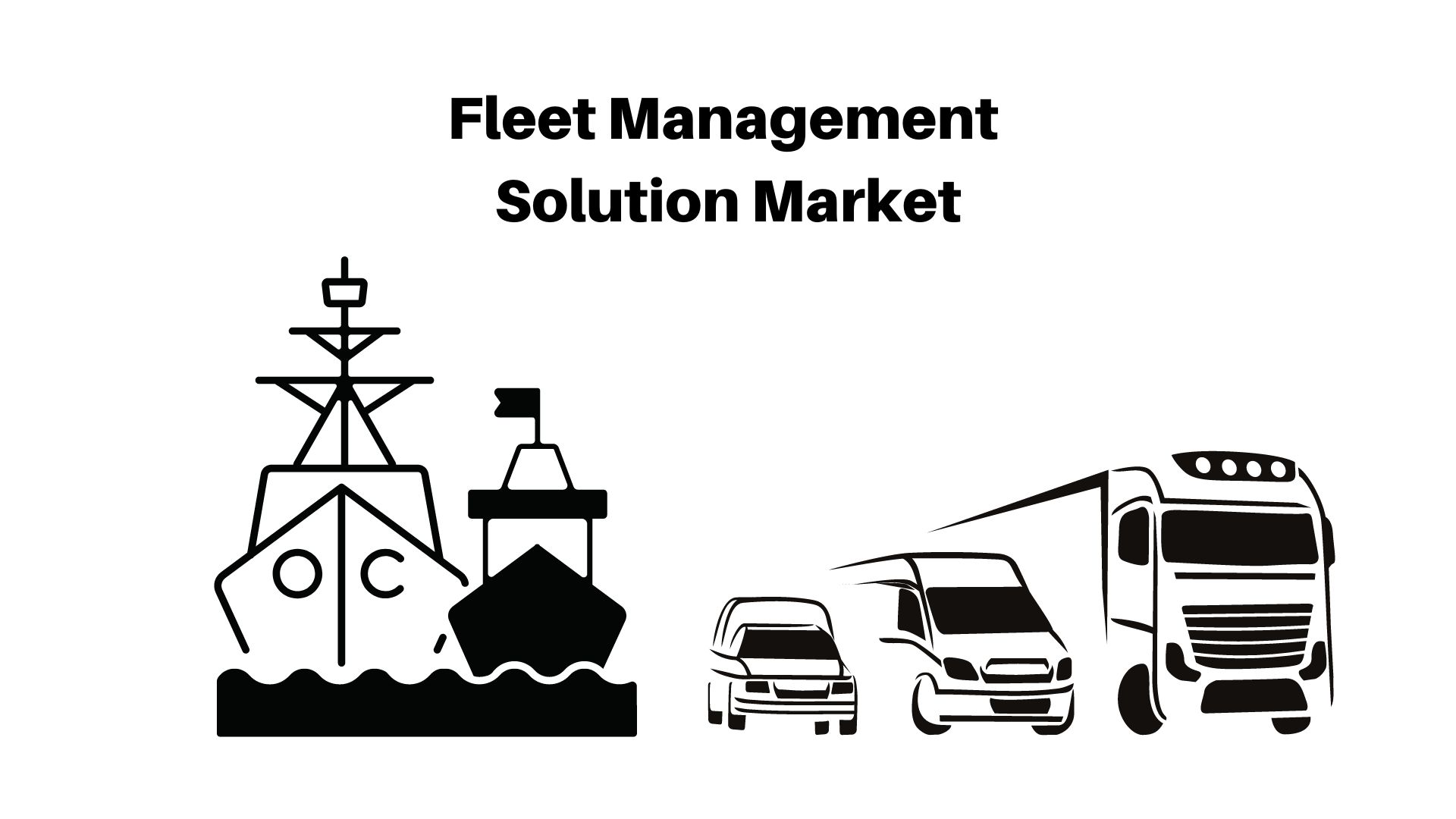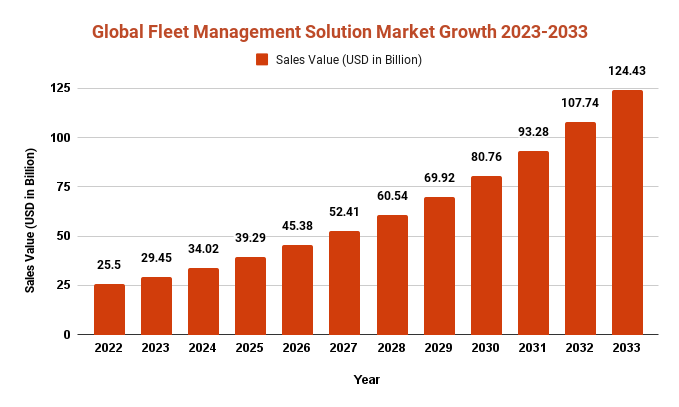Fleet Management Solution Market Expected to Expand at a Growing CAGR of 15.5% through 2033

Page Contents
Market Overview
Published Via 11Press: Fleet Management Solution Market: Fleet management solutions refer to a suite of technologies, processes and services designed to assist companies in effectively managing and optimizing their vehicle fleets. These solutions typically consist of software platforms, data analytics tools, and other technologies that enable companies to monitor and manage their fleet vehicles in real-time. Fleet management solutions Market can reduce operational costs, boost efficiency levels, and enhance safety levels for employees. By using fleet management solutions, companies can monitor their vehicle performance, location and fuel consumption, as well as schedule maintenance and repairs. Furthermore, fleet management solutions help companies adhere to regulatory requirements such as hours-of-service regulations for drivers.
The Global Fleet Management Solution market represented USD 25.5 Bn in 2022 and will anticipate around USD 124.43 Bn by 2033 projected around CAGR of 15.5% amid forecast frame of 2023 to 2033.
Fleet management solutions typically feature GPS tracking, vehicle diagnostics, driver behavior monitoring, fuel management, maintenance tracking and route optimization. These features help companies optimize their fleet utilization, reduce fuel consumption and protect drivers' safety. Fleet management solutions can be customized for various industries like transportation, logistics construction or emergency services so that companies of any size can benefit from them – whether small businesses with a few vehicles or large enterprises with thousands of vehicles.
Key Takeaways
- Fleet management solutions refer to the set of technologies, processes and services that companies use for effective management and optimization of their vehicle fleets.
- These solutions can assist companies in reducing operational expenses, increasing efficiency, and enhancing safety protocols.
- Fleet management solutions typically consist of software platforms, data analytics tools and other technologies that permit companies to monitor and manage their fleet vehicles in real-time.
- Key features of fleet management solutions include GPS tracking, vehicle diagnostics, driver behavior monitoring , fuel management, maintenance tracking and route optimization.
- Fleet management solutions can be tailored to fit the requirements of different industries, such as transportation, logistics, construction and emergency services.
- These solutions can be employed by companies of all sizes, from those with just a few vehicles to large enterprises with thousands of cars.
- Fleet management solutions offer companies the potential to optimize fleet utilization, reduce fuel consumption and safeguard drivers by providing them with safety protocols.

Request For Sample Report Here: https://marketresearch.biz/report/fleet-management-solution-market/request-sample/
Regional Snapshot
- North America: The North American market for fleet management solutions is one of the largest worldwide. It boasts many major players in this industry and features high levels of innovation and technological progress. The United States leads this region's fleet management solution market share, followed by Canada and Mexico.
- Europe: The European market for fleet management solutions is a major player on the global scene. It boasts an established infrastructure and many companies that rely on these solutions. This market is characterised by intense competition and innovation, with major markets located in United Kingdom, Germany, and France.
- Asia Pacific: The Asia Pacific market for fleet management solutions is experiencing rapid growth, due to the increasing adoption of technology and expansion in e-commerce and logistics industries. The region boasts numerous emerging economies that foster high levels of innovation and competition. China, Japan, and India are the three largest markets within this region.
- Latin America: The Latin American market for fleet management solutions is relatively small but growing rapidly. The region is highly fragmented, with many small and medium-sized businesses using these systems. Brazil, Mexico, and Argentina are the three largest markets within this region.
- Middle East and Africa: The Middle East and Africa market for fleet management solutions is still relatively small but growing. The region experiences high demand for logistics and transportation services, particularly within the oil and gas sector. South Africa, Saudi Arabia, and the UAE are the largest markets within this region.
Inquire with our industry specialist: https://marketresearch.biz/report/fleet-management-solution-market/#inquiry
Drivers
- Cost Savings: Companies often adopt fleet management solutions due to the potential savings they provide. By using these solutions, companies can reduce operational expenses by optimizing fleet utilization , cutting fuel consumption and minimizing maintenance expenses.
- Efficiency: Fleet management solutions can assist companies in optimizing routes, cutting idle time, and streamlining operations. This could lead to faster delivery times, improved customer satisfaction levels , and increased revenue.
- Safety: Fleet management solutions can assist companies in improving the safety of their drivers and reducing accidents. By monitoring driver behavior, providing training and coaching, and enforcing safety policies , companies can reduce accidents and enhance their safety record.
- Compliance: Businesses operating a fleet of vehicles are subject to various regulations and compliance obligations, such as hours-of-service regulations for drivers. Fleet management solutions can help companies stay compliant with these necessities and avoid fines or penalties.
- Customer Service: In industries such as logistics and transportation, customer service is a crucial differentiator. By using fleet management solutions to optimize routes, reduce delivery times, and provide real-time tracking information, companies can enhance their customer service while gaining an edge in the competition.
Restraints
- Adopting fleet management solutions can be costly, particularly for small and medium-sized businesses. The costs associated with purchasing hardware and software, training employees, and integrating the solution with existing systems may be substantial. Businesses may be reluctant to adopt new technologies or alter their processes, especially if they have been using the same system for some time. This resistance could impede adoption of fleet management solutions. Fleet management solutions necessitate collecting and storing sensitive data, such as vehicle and driver info, GPS data, and customer details. Companies must ensure this data is safeguarded against cyber threats and other security hazards.
- In some areas, connectivity may be spotty or intermittent, especially rural ones. This makes it difficult to implement fleet management solutions that require real-time data and communication. Adopting and managing fleet management solutions necessitate specialized knowledge base and experience. Companies may face difficulty recruiting personnel with the required knowledge base and experience to efficiently administer the solution. Fleet management solutions must typically be integrated with existing systems and processes, such as enterprise resource planning (ERP), dispatch software, and accounting packages. Integration can be complex and time-consuming for companies with legacy infrastructures.
Opportunities
- Growth of E-commerce: As e-commerce continues to expand, so too do demand for logistics and transportation services. This presents new opportunities for companies providing fleet management solutions. With the expanding e-commerce market, those who can offer cutting-edge solutions that expedite delivery times while cutting costs are likely to succeed.
- Adoption of IoT and Big Data: The adoption of Internet of Things (IoT) and Big Data technologies is creating new possibilities for fleet management solutions. IoT sensors and devices can be utilized to collect real-time data on vehicles and drivers, while Big Data analytics helps analyze this data to provide valuable insights that can help optimize operations.
- Electric and Autonomous Vehicles: The advent of electric and autonomous vehicles has presented fleet management companies with new opportunities. These vehicles require specialized management and upkeep, so those that can provide solutions that maximize their efficiency and performance are likely to succeed.
- Globalization of Supply Chains: The globalization of supply chains has created new opportunities for fleet management solutions. Companies operating fleets in multiple countries need systems that offer real-time tracking, optimize routes across borders, and adhere to regulations across different jurisdictions.
- Shift to Mobility as a Service: The shift towards Mobility as a Service (MaaS) presents new opportunities for fleet management solutions. MaaS providers need solutions that can manage various transportation modes such as public transit, ride-sharing and micro-mobility with seamless integration to other transportation services.
Challenges
- Many companies still rely on legacy systems for fleet management, making it difficult to integrate new technologies and solutions. Companies must carefully plan and implement integration strategies to guarantee the new solutions can work seamlessly with existing systems.
- Fleet management solutions generate vast amounts of data, such as vehicle performance metrics, driver behavior patterns, and customer information. Companies must take great care in planning these strategies for optimal success. Companies need effective data management strategies in place to guarantee accurate, secure, and easy-to-access information. Maintenance and repair are crucial elements of fleet management; companies must guarantee vehicles receive proper care to minimize downtime and guarantee safety.
Market Segmentation
By Deployment
- Cloud
- On-Premise
By Type
- Vehicle Management
- Driver Management
- Operations Management
By End-Use Industry
- Transportation & Logistics
- Automotive
- Retail
- Government
- Shipping
Key Players
- Trimble Inc.
- Element Fleet Management Corp.
- Daimler Fleet Management GmbH
- JDA Software Group, Inc.
- Wheels, Inc.
- MiX Telematics Ltd.
- TomTom Telematics BV.
- Magellan Navigation, Inc.
- Emkay, Inc.? And Telogis, Inc
Report Scope
| Report Attribute | Details |
| Market size value in 2022 | USD 25.5 Bn |
| Revenue forecast by 2033 | USD 124.43 Bn |
| Growth Rate | CAGR Of 15.5% |
| Regions Covered | North America, Europe, Asia Pacific, Latin America, and Middle East & Africa, and Rest of the World |
| Historical Years | 2017-2022 |
| Base Year | 2022 |
| Estimated Year | 2023 |
| Short-Term Projection Year | 2028 |
| Long-Term Projected Year | 2033 |
Growing Demand => Request for Customization
Recent Developments
Following are some recent advancements in the field of fleet management solutions:
- Utilization of Artificial Intelligence (AI) and Machine Learning (ML): Fleet management solutions are now incorporating AI and ML to boost efficiency and effectiveness in fleet operations. AI/ML algorithms can be utilized for optimizing routes, anticipating maintenance needs, as well as increasing fuel efficiency.
- Integration with Electric Vehicles (EVs): As more companies transition towards electric vehicles, fleet management solutions are being created in order to support them. These can provide real-time monitoring of battery life, optimize charging schedules, and track energy consumption.
- Expansion of Telematics: Telematics solutions have become more sophisticated, now being integrated with various other technologies like AI, ML and IoT. These can provide real-time tracking of vehicles, monitor driver behavior and optimize routes based on traffic conditions or other factors.
- Utilization of Augmented Reality (AR) and Virtual Reality (VR): AR and VR technologies are being employed to enhance training and support for drivers and technicians. AR/VR can be utilized to replicate real-world scenarios and offer immersive training experiences.
- Adoption of Blockchain Technology: Blockchain technology is being explored as a means to enhance security and transparency in fleet management solutions. Blockchain can be utilized for securely storing and sharing data, monitoring maintenance and repair records, as well as confirming compliance with regulations.
Key Questions
1. What is a fleet management solution?
A fleet management solution is an IT software system designed to help companies better manage their vehicle fleets. It may include features like real-time tracking, route optimization, driver performance monitoring and maintenance scheduling.
2. What are the advantages of using a fleet management solution?
Fleet management solutions help companies save time and money by optimizing routes, cutting fuel consumption, and improving vehicle maintenance. Furthermore, they enhance safety and compliance by monitoring driver behavior and ensuring vehicles receive proper upkeep.
3. How does a fleet management solution function?
A fleet management solution uses technologies , such as GPS tracking, telematics and data analytics to monitor vehicles in real-time and provide insights into vehicle performance, driver behavior and other key metrics. This data can then be utilized to optimize routes, schedule maintenance checks and enhance overall fleet efficiency.
4. What types of companies can benefit from a fleet management solution?
Fleet management solutions have applications across many industries, such as transportation, logistics , construction and delivery services. Any business that manages an automobile fleet will find value in the increased efficiency and cost-savings these solutions provide.
5. What should you look for when selecting a fleet management solution?
Some key features to look for in a fleet management solution include real-time tracking, route optimization, driver performance monitoring, maintenance scheduling and reporting/analytics. Which features are most crucial will depend on the needs and objectives of the company using the solution.
Contact us
Contact Person: Mr. Lawrence John
Marketresearch.Biz (Powered By Prudour Pvt. Ltd.)
Tel: +1 (347) 796-4335
Send Email: [email protected]
The team behind market.us, marketresearch.biz, market.biz and more. Our purpose is to keep our customers ahead of the game with regard to the markets. They may fluctuate up or down, but we will help you to stay ahead of the curve in these market fluctuations. Our consistent growth and ability to deliver in-depth analyses and market insight has engaged genuine market players. They have faith in us to offer the data and information they require to make balanced and decisive marketing decisions.



